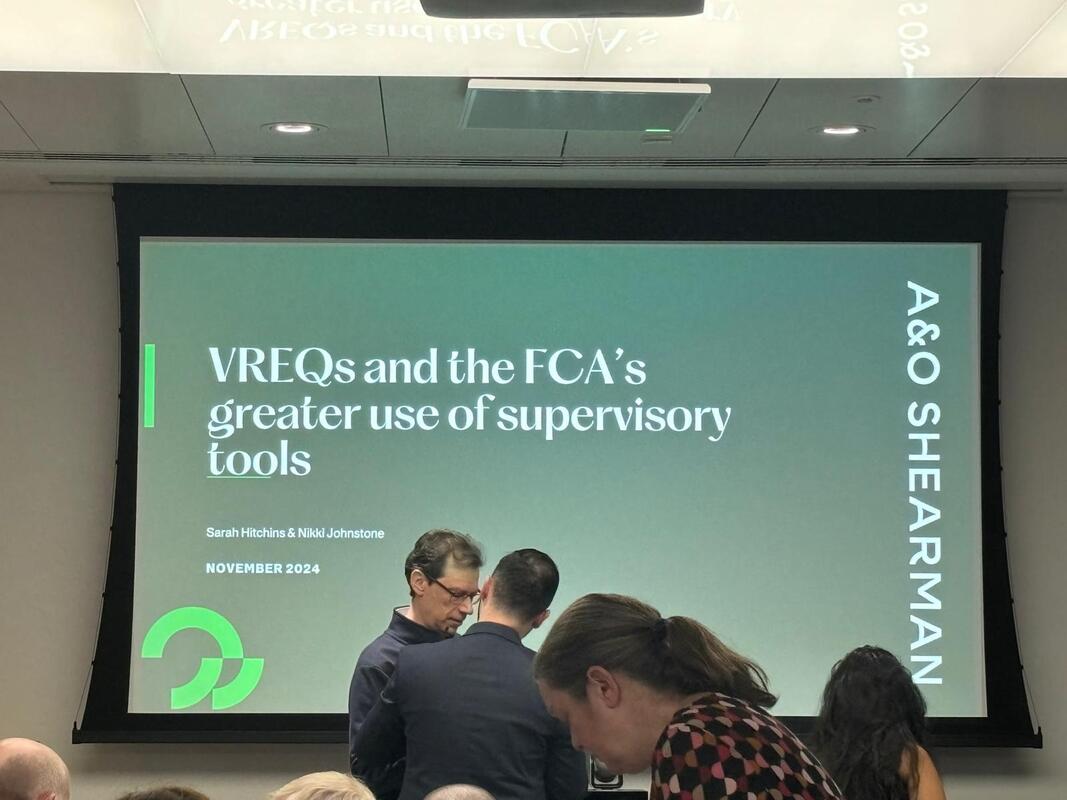
On 19 November 2024, The Institute held its final quarterly members' meeting of the year, hosted by A&O Shearman in London. The event featured a panel discussion on the FCA's recent enforcement actions, which reflected the FCA’s evolving use of supervisory requirements, such as VREQs and OIREQs. The discussions provided valuable insights into the regulatory landscape and enforcement trends, sparking thought-provoking conversations. This Institute Insights article summarises the key points and takeaways from the session.
*****************************************
A VREQ, or Voluntary Requirement, is a tool used by the Financial Conduct Authority (FCA) as part of its supervisory activities. It involves an agreement between the FCA and a firm where the firm voluntarily agrees to take specific actions or refrain from certain activities. This can include ceasing particular business activities, implementing compliance measures, or addressing identified risks.
The number of VREQs agreed by firms with the FCA has increased considerably over the last 3 years. They are made public in approximately 80% of cases with the press sometimes reporting them. The FCA can also use its own initiative powers to impose requirements on firms (OIREQs), including if firms decline to agree to VREQs.
Seriousness is required when dealing with regulatory requests, particularly from bodies like the FCA but firms often underestimate them, viewing them as temporary administrative hurdles rather than significant commitments. A failure to handle such requests appropriately - by escalating them to the right person or ensuring proper resources for compliance - can result in long-term challenges. It is important that senior leadership (including the CEO) needs to be reminded of the gravity of these commitments and the importance of following due process to avoid future regulatory complications. VREQs may not happen if firms are able to commit to enhancements they promised the FCA.
FCA’s Use of VREQs and Skilled Persons (Enforcement vs. Supervision)
The FCA increasingly uses VREQs and Skilled Persons Reviews as interventionist tools. VREQs allow the FCA to mitigate risks quickly by compelling firms to address specific issues, such as stopping high-risk customer onboarding until compliance deficiencies are rectified. This approach shifts the burden to firms, incentivising them to resolve problems efficiently while avoiding public enforcement actions.
Whilst VREQs are seen as proportionate tools, the panel acknowledged criticism about their discretionary nature and potential for inconsistency. Some argue that firms face undue restrictions, particularly in severe cases where VREQs halt all trading activities, jeopardising financial stability. The panel agrees that the process requires careful negotiation and proactive engagement with the FCA to strike a balance between risk mitigation and operational continuity. Scope must be clear so that firms are able to meet expectations.
Challenges of Skilled Persons and Scope Creep
Skilled Person Reviews, sometimes conducted alongside VREQs being in place sometimes expand beyond their original mandate. There are examples where Skilled Persons have requested information unrelated to their scope, creating additional burdens for firms. Proactively and constructively managing relationships with Skilled Persons and receiving regular updates about their work are key strategies for minimising scope creep. It is usually possible to gently query requests from a skilled person that concern topics not forming part of their agreed scope. The FCA may support the firm if the matter cannot be settled directly with the Skilled Person - but this is by no means guaranteed.
The panel also discussed the subjectivity involved in Skilled Persons' recommendations, which may reflect the Skilled Person’s own in internal risk appetite rather than the firm or FCA’s. This can lead to disproportionate expectations being placed on firms that exceed regulatory expectations ("gold plating"). Being clear with Skilled Persons whether recommendations relate to regulatory requirements, industry best practice of “gold plating” is helpful.
Practical Strategies for Managing FCA Interactions
The panel provided practical advice for firms dealing with the FCA. It is important to recognise signs in FCA communications that all may not be going well - such as more assertive language, more formal requests or tighter deadlines - and escalating concerns internally to senior management. Early engagement with internal and external advisors can help firms navigate complex situations and, in some cases, avoid escalation to VREQs. Firms must ensure internal teams understand and implement FCA requirements rigorously, avoiding situations where key information is overlooked due to a lack of communication.
Every interaction with the FCA forms part of a broader narrative about the firm, underscoring the need to treat all communications as significant date points from the regulator's perspective. VREQs and attestations should be signed by senior leaders, such as the CEO, to reflect the organisation’s commitment to compliance.
Addressing Gold Plating and Industry Standards
Skilled Person Reviews can feature recommendations reflecting gold-plating of regulatory requirements. Firms can understand this risk during the Skilled Person selection process by asking detailed questions about how findings will be presented and prioritised in their work. Establishing a collaborative relationship with the Skilled Person while maintaining independence given their obligations to the FCA is critical to ensuring practical and proportionate recommendations.
Leveraging industry body guidance to support firms’ positions can work when challenging gold-plated recommendations rather than putting personal beliefs forward. This approach can provide credible evidence to demonstrate that certain recommendations are aspirational rather than essential.
Balancing Best Practice with Proportional Compliance
There is tension between achieving best practice and meeting proportional compliance standards, especially for smaller firms. Firms should be prepared to justify deviations from best practice by demonstrating how their approach aligns with the FCA’s principles and legal / regulatory standards. Open and constructive dialogue with the FCA is essential for resolving such issues without appearing defensive. It is usually safest to adopt a collaborative approach with Skilled Persons and the FCA, focusing on evidence-based arguments to achieve fair outcomes.
Tom Vidovic is a senior financial crime compliance specialist. He held several roles in the financial services industry as well as the consulting sector, including as Financial Crime Advisory Manager for Deloitte; Associate Director, FCC Controls for Standard Chartered Bank; Financial Crime Forensic Manager for KPMG; and FIU Financial Crime Consultant for Wells Fargo; and most recently as Nominated Officer for Ghana International Bank. He is a Certified Fraud Examiner, Certified Anti-Money Laundering Specialist, and holds an MBA in Sustainable Finance.



